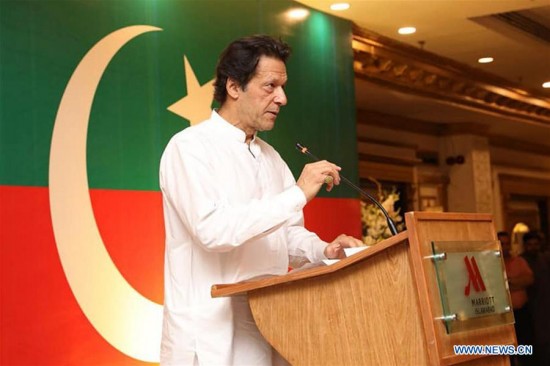Can Imran Khan bring peace between India and Pakistan?
Thu 09 Aug 2018, 12:37:47

As a kid growing up in India in the bleak days of the late 1980s and early 1990s, it was a surreal experience watching Pakistan and India cricket matches. It is difficult for someone not living in the subcontinent to understand what sporting rivalry can mean between two countries which share common traditions of food, language, culture and history but that have fought three existential wars.
That said, Pakistani cricketers were more glamorous than Indians, simply because Pakistan was in the Western block and India languished in the late 1980s Soviet style economic stagnation. Imran Khan epitomized the posh-playboy Londoner. To put it simply, Imran Khan was a character out of a noir film, someone kids would love to hate as well as imitate. Then something changed in the late 1990s.
India somehow turned modern like a chrysalis, the economy changed almost overnight, resulting in cultural exchanges with the U.S. and U.K. The geopolitical scenario in the continent also changed, and that was reflected in Pakistan's transformation as well, especially the war in Afghanistan and the subsequent Drone strikes and mass radicalization. But nowhere was the transformation more radical than watching Imran Khan ditch his posh accent for an earthier one, and scrap his suits for Sherwanis.
Politicians, especially in feudal democratic setups, need a certain sense of authenticity to touch the chords with the masses, and Imran Khan, whether deliberately or due to the advice of PR, did that perfectly.
Now, this man has won the election to become Pakistan's PM. As a remarkable and relatively peaceful transfer of power happens in Pakistan, it is important to look at the prospects of peace in the subcontinent. "We currently have the backing of 168 members including coalition parties and the reserved seats for minorities and women and we are in talks with more independent candidates who will join us in the coming days," Khan was quoted by NDTV, to have said as he declared his win in his country's parliament, and the ruling party has said they will form a stable opposition, even as protests are rocking Pakistan's Punjab province.
Imran Khan naturally draws sharp reactions in the west, where most of the commentators are either completely
unfamiliar or skeptical about him. Khan has previously blamed the U.S. for drone strikes as well as consistently talked about signing a deal with the Taliban in Afghanistan.
unfamiliar or skeptical about him. Khan has previously blamed the U.S. for drone strikes as well as consistently talked about signing a deal with the Taliban in Afghanistan.
Recently, however, he has mellowed down and his first move after winning the elections was promising. On India, Khan said that if India is willing to take one step, Pakistan will take two. Khan has also talked with the Indian PM Modi, over the telephone, and according to India's MEA, Modi and Khan spoke about peace and development in the entire neighborhood.
Khan's first move was to invite Modi, and also other former Indian cricketers, for his inauguration – a prevalent form of sports diplomacy in the subcontinent. He has also mentioned working with the U.S. and China, and preventing the spread of the most chronic illness across Pakistan; bureaucratic corruption. So far so good.
However, it remains to be seen, even while one can be cautiously optimistic, with regards to Imran Khan, how much he will be able to maneuver. For example, India is governed by the Modi administration, a nationalist government, which by definition means that it makes the country more inflexible when it comes to foreign policy.
The border clashes need to cease, as well as the process of détente needs to restart. However, any provocation from Pakistan's side, even if by rogue elements would mean that India would fall back into a disillusioned antagonistic position. Likewise, Khan's real challenge comes from balancing the U.S. and China.
On one hand, Khan blames the U.S. for destabilizing Afghanistan, but on the other hand, if the U.S. leaves Afghanistan, the aid money from DC will also dry up, as the U.S. wouldn't need the help of Pakistan anymore. Likewise, the pressure to choose between Chinese investment and IMF bailout will also prove tricky as the Asian geopolitical situation gets more complicated.
That said, stranger things have happened in geopolitics. No one in 1971 thought there would be a thaw between China and the U.S. But it happened nonetheless. In times of strife, the masses support a strong-willed man, and that gives Imran Khan a huge opportunity to reshape the subcontinental politics for generations to come.
No Comments For This Post, Be first to write a Comment.
Most viewed from International
Most viewed from World
AIMIM News
Latest Urdu News
Most Viewed
May 26, 2020
Do you think Canada-India relations will improve under New PM Mark Carney?
Latest Videos View All
Like Us
Home
About Us
Advertise With Us
All Polls
Epaper Archives
Privacy Policy
Contact Us
Download Etemaad App
© 2025 Etemaad Daily News, All Rights Reserved.

.jpg)
.jpg)
.jpg)






.jpg)


.jpg)
.jpg)
.jpg)
.jpg)
.jpg)
.jpg)
.jpg)
.jpg)
.jpg)
.jpg)
.jpg)
.jpg)

















